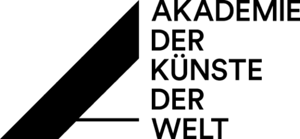March 18–June 24, 2016
Im Mediapark 7
50670 Cologne
Germany
T +49 221 3377480
info@adkdw.org
The Academy of the Arts of the World, Cologne presents its program for spring 2016, the PLURIVERSALE IV.
Cologne recently made headlines for all the wrong reasons. Since the violence on New Year’s Eve, the city has found itself at the center of a heated discussion on Germany’s “culture of welcome” and its realities. As entire communities fall under general suspicion, old, implicitly racist power relations reemerge from repressed colonial memories, giving rise to conflicts with an increasingly explosive form.
The mission of the Academy of the Arts of the World is to challenge such power relations in its own field. Founded in 2012, the Academy serves as a space for intercultural debate, focusing both on non-Western practices and the complex polyphonic situation of cultural agents in the post-migrant Germany of today. The Academy of the Arts of the World has its own venue, the Academyspace, which, along with other places in the city, hosts the PLURIVERSALE, a dense program of events held twice a year. Now in its fourth edition, this season runs from March until June and offers discussions, performances, screenings, concerts, an opera and an exhibition. The program’s special focus is on the current debates around a city profoundly shaped by migration and a forgotten colonial past.
The season begins with the Youth Academy, whose fellows join guest-curator Ulf Aminde for a series of workshops revisiting the theories, practices, and debates around the notion of “critical whiteness,” that raised a memorable controversy in Cologne during the No Border Camp of 2012, where anti-racist activists gathered from all over Germany. A growing awareness of Cologne’s own colonial history provides the point of departure for the exhibition Afrikahafenfest by locally based artists Peter Güllenstern and Jürgen Stollhans, who, in a fragmented film narrative based on found materials and a research installation, investigate the intertwining of modernization and colonial representation on the Rhine embankment. Filmmaker and artist Pascale Obolo presents her work in progress on the uncannily romantic Castle Puttkamer, a former German governor’s residence in Cameroon. Later in the season, artist Philip Metz joins Joshua Kwesi Aikins and Christoph Biermann to discuss his recent work using football to reflect upon surrogate warfare between colonial empires. The production of knowledge itself is in need of decolonization, as Grada Kilomba suggests in her lecture performance. Symposia, talks, and a non-hierarchical Open Forum will hold discussions on the outcome of the so-called “refugee crisis,” the future of Germany and Europe; among the participants, philosopher Srećko Horvath and writer Fred Khumalo.
How does art counteract the new closures, how does it fight against structural racism, how does it deconstruct national identity? Theoretician Nikos Papastergiadis investigates the diasporic intimacies of aesthetic cosmopolitanism, while Christopher Kirkley shows how he collaborated with a Tuareg guitar hero to produce a crowd-funded remake of Prince’s Purple Rain. Academy member and composer Liza Lim premieres her new opera, based on a book by Jonathan Safran Foer. Renzo Martens, Eva Barois De Caevel and Françoise Vergès look at the work of the Cercle d’Art des Travailleurs de Plantations Congolaises in the confrontation of Western structures of distribution with traditional practices, and explore the alternatives to NGO-like, often neo-colonial help. A mini-retrospective of screenings by Cairo-based artist Maha Maamoun shows how artists might create productive estrangements to the nationalism permeating visual culture in the wake of liberation processes. Is it possible to avert a neo-colonial future of the kind imagined by Nature Theater of Oklahoma, when it invites the audience to a participatory film performance imagining Cologne in the year 2071, where extraterrestrials who look like humans are imported for their tasty meat?
The PLURIVERSALE IV is curated by Ekaterina Degot and David Riff, with assistance from Léa Genoud and Nora Wiedenhöft and the whole Academy team.
For a complete program of PLURIVERSALE IV, please see www.academycologne.org.



